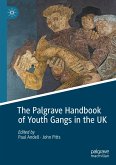This critical textbook looks beyond the immediate data on knife crime to try and make sense of what is a global phenomenon. Yet it especially explores why the UK in particular has become so preoccupied by this form of interpersonal, often youthful, violence. The book explores knife crime in its global and historical context and examines crime patterns including the "second wave" of knife crime in Britain. It then incorporates new empirical data to explore key themes including: police responses, popular narratives, and the various interests benefiting from the 'knife crime industry'. It captures the "voices" of those impacted by knife crime including young people, community leaders, and youth work practitioners. Drawing on criminology, sociology, cultural studies and history, the book argues that the problem is firmly located at the intersection of a series of concerns about class, race, gender and generationthat are a product of British history and its global past. It seeks to trace the several roots of the contemporary knife crime 'epidemic', ultimately to propose newer and alternative strategies for responding to it. It encourages a critical engagement with this subject, with the inclusion of some learning exercises for undergraduate students and above in the the social sciences, whilst also speaking to researchers, policy-makers and practitioners.








